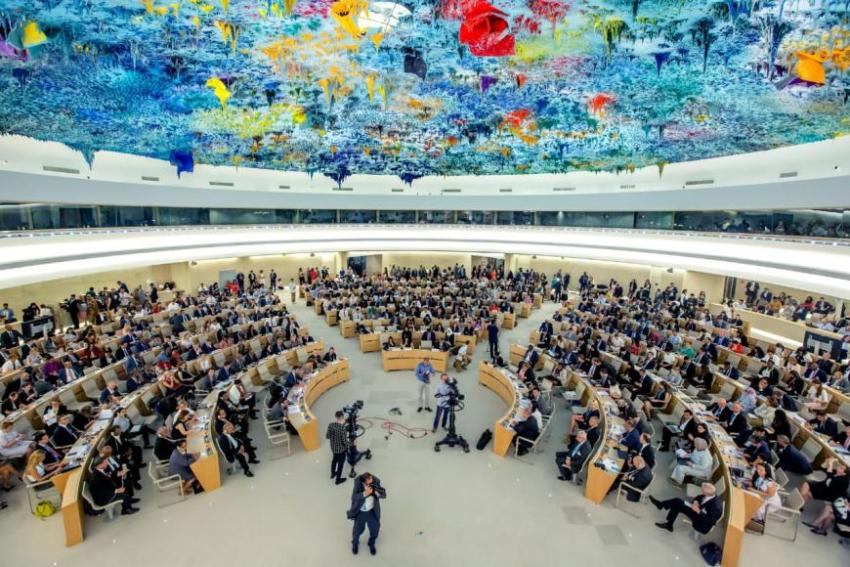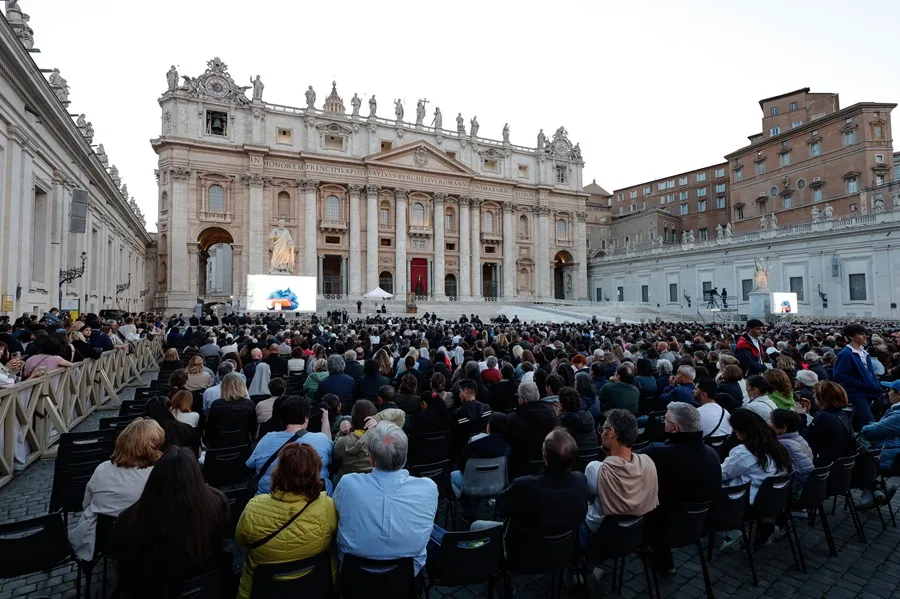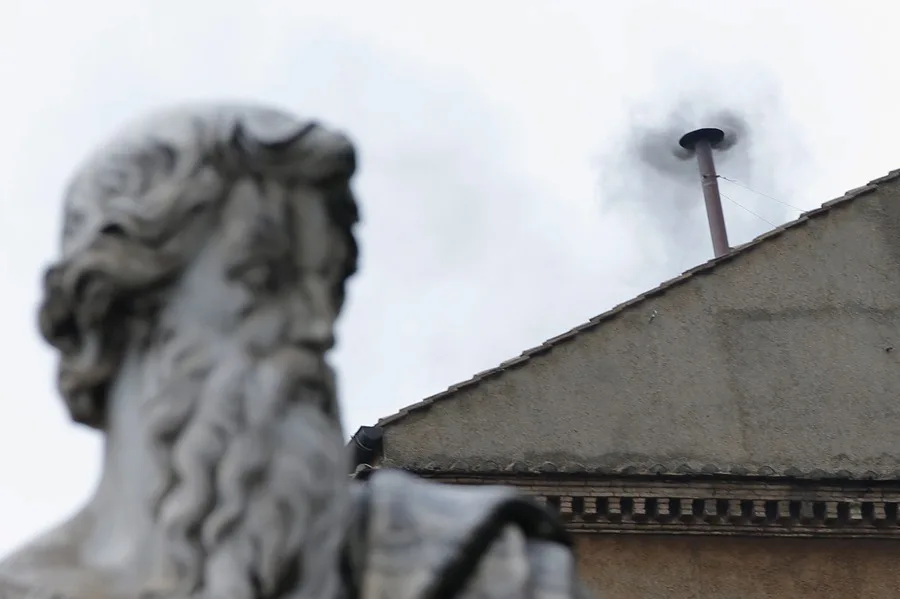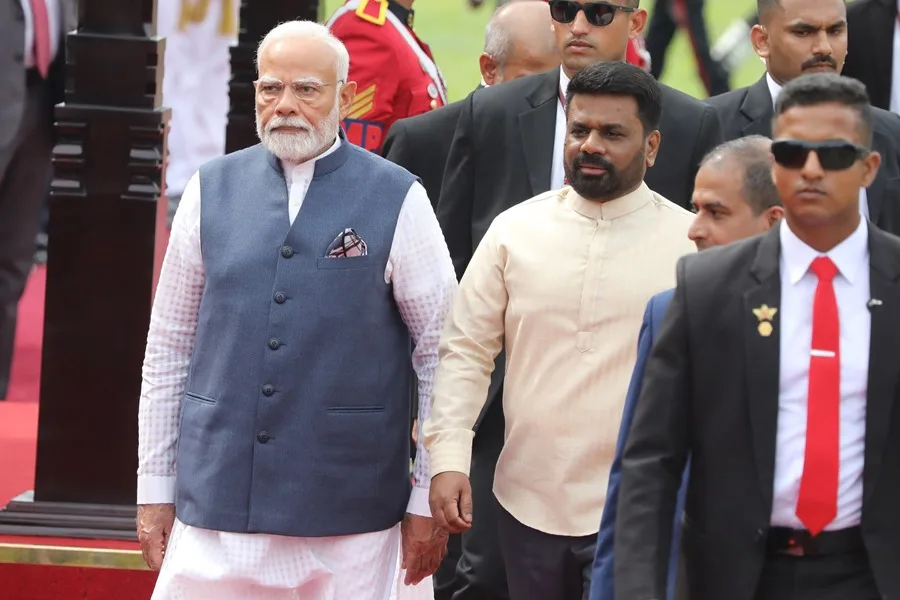International
Venezuela fails in bid to renew UN rights council seat

AFP | Agnes Pedrero
China and Russia will lose a trusted ally in the UN Human Rights Council after Venezuela, which stands accused of serious violations, failed Tuesday to renew its seat.
“Great news that UN General Assembly rejected Venezuela’s re-election bid,” Louis Charbonneau, UN director at Human Rights Watch, tweeted after the vote.
Fourteen seats — nearly a third of the 47-member council — were up for grabs during Tuesday’s vote in New York, although there was only suspense around a small portion of them.
Rights council membership is divided between five regional groups, which typically pre-select the candidate countries for the three-year term ahead of the vote, leaving little room for competition.
There were however competitive races in two regions this year: Asia-Pacific, where there were six candidates for four seats, and Latin America and the Caribbean, where three candidates contested two seats.
In the latter group, Venezuela was running against Chile and Costa Rica.
‘Unfit for membership’
Human Rights Watch and other groups had urged nations not to vote for Venezuela, pointing to findings by UN investigators suggesting President Nicolas Maduro and other members of his government are behind crimes against humanity in the country.
“Venezuela’s vengeful assault on critics of the government makes the country unfit for membership in the UN’s top rights body,” Charbonneau said before the vote, warning that handing Caracas a seat “would undermine the UN’s credibility”.
When the count around the large UN General Assembly hall was done, Venezuela secured only 88 votes, falling short of the required 97-vote majority and far behind the 144 votes taken by Chile and 134 for Costa Rica.
The composition of the council matters, especially as swelling geopolitical tensions increasingly colour the debates and votes in the Geneva-based body.
Tuesday’s vote came on the heels of a historic council session marked by the first-ever attempts to push through resolutions targeting China and the situation inside Russia.
The council accepted the resolution brought by most EU countries calling for a special rapporteur to monitor the rights situation in Russia, amid concerns of domestic crackdown as Moscow’s war rages in neighbouring Ukraine.
But it narrowly rejected a more tepid text put forward by the United States merely asking for a debate on violations in Xinjiang.
The proposal came after a UN report cited possible crimes against humanity against Uyghurs and other Muslim minorities in the far-western Chinese region.
‘Consistent ally’
While this was a heavy defeat for Western nations, and appeared to signal a shifting power balance in the council, observers suggest a few changes in the body’s membership could allow the next resolution targeting China to pass.
New council members with a “more robust and principled approach” to human rights crises could “greatly increase” the chances of a future initiative on China succeeding, said Raphael Viana David of the International Service for Human Rights.
Venezuela was staunchly in the ‘no’ camp on both those votes, and is among the nations that repeatedly slam attempts to call out abuses by specific countries at the council as a “politicisation” of human rights.
“Venezuela has been a consistent ally of both China and Russia at the council,” ISHR’s Tess McEvoy told AFP.
International
From the transfer of the coffin to the funeral, three days to say goodbye to Pope Francis

The public funeral of Pope Francis will begin this Wednesday, with the transfer of the coffin to St. Peter’s Basilica to receive the tribute of the faithful, who will have three days to say goodbye to the pontiff, until Saturday, when the funeral and the funeral of the pontiff will be held.
The coffin with the body of Francisco, who died this Monday at the age of 88 due to a stroke after months of suffering serious respiratory problems, has been veiled since his death in his residence of the Casa Santa Marta at the express request of the pope, who made some changes in the rules to simplify the funerals of the pontiffs.
From today, the faithful, with whom Francisco liked so much to surround themselves to feel his closeness and affection, will be able to go to the basilica to say goodbye during three intense days in which the temple will be open Wednesday and Thursday until midnight.
At 9.00, local time (10.00 GMT), and after a moment of prayer, chaired by the carmarlengo, Cardinal Kevin Joseph Farrell, “the translation” of the body will begin, as decided by the 60 cardinals participating this Tuesday in the first general congregation or preparatory meeting for the conclave.
The procession will pass through Santa Marta Square and the Roman Protomartyrs Square and from the Arch of the Bells will exit to St. Peter’s Square and enter the Vatican Basilica through the central door.
Then on the Altar of Confession, under the canopy, the chamberlened cardinal will preside over the Liturgy of the Word, at the end of which the visit of the faithful will begin.
The funerals will be on Saturday, April 26 at 10.00, local time (8.00 GMT), in St. Peter’s Square, while tomorrow, Wednesday, the coffin will be transferred to the Vatican Basilica to receive the tribute of the faithful.
The ceremony, which is scheduled for the arrival of Heads of State from all over the world, will begin at 10.00 local time (8.00 GMT) and will be officiated by the dean of the college of cardinals, Giovanni Battista Re.
Then, the coffin will be transferred to the basilica of Santa María la Mayor to be buried, as the Argentine pontiff left in his will.
“Thank you for bringing me back to the Square,” Francisco said to his personal health assistant, Massimiliano Strappetti, for encouraging him to make his last trip on the papamobile on Sunday, after the Urbi et Orbi blessing, touring St. Peter’s Square among the faithful.
These words, among the last of the pontiff, according to the Vatican media, show once again the importance that “the pope of the disadvantaged” gave to contact with people, even in their last hours.
“Around 5.30 in the morning the first symptoms appeared, with the prompt intervention of those who took care of him. More than an hour later, after greeting Strappetti, who was lying in bed in his apartment on the second floor of Casa Santa Marta, the pope fell into a coma. He didn’t suffer, everything happened quickly, says someone who was by his side in those last moments,” Vatican news revealed.
According to the date chosen for the funeral and the rules governing the process, the conclave must be held between May 5 and 15, since no more than 20 days should pass and the funerals, the so-called Novediales, in which suffrage masses are held by the late pontiff, cannot be called during the successive days.
Despite having been elected mostly by Pope Francis, the 135 cardinals from 71 countries who will form the conclave that will choose their successor are a heterogeneous group that is not known and without a common idea about the future of the Church, which will make them present themselves in the Sistine Chapel strongly divided.
There are many differences with respect to the conclave that met twelve years ago to elect Jorge Bergoglio: one is the number of cardinal electors, that is, those who are under 80 years old on the day of the pope’s resignation or death, which is much greater than on other occasions, and another, the largest number of countries from which they come.
International
A very heterogeneous and divided conclave will elect the new pope

Despite having been elected mostly by Pope Francis, who died this Monday at the age of 88, the 135 cardinals from 71 countries who will form the conclave that will elect their successor are a heterogeneous group that is not known and without a common idea about the future of the Church, which will make them present themselves in the Sistine Chapel strongly divided.
There are many differences with respect to the conclave that met twelve years ago to elect Jorge Bergoglio: one is the number of cardinal electors, that is, those who are under 80 years old on the day of the pope’s resignation or death, which is much greater than on other occasions, and another, the largest number of countries from which they come.
“Yes, I think that the fact that the 135 voters come from 71 countries could have weight in the conclave, since a candidate needs two-thirds of the votes to be elected. In 2013, that meant 77 votes. In the next conclave, based on the current number of voters, it would be 91. To date, 68 voters come from Europe and North America,” analyzes Irish journalist Gerard O’Connell in his book “The election of Pope Francis: an intimate account of the conclave that changed history.”
In addition, “the fact that many of the cardinals do not know each other so well, except those who participated in the synod, could create some difficulties, so they will depend more on the ‘makers of kings’, who are esteemed and influential cardinals, many of them over 80 years old,” says the also correspondent in Rome of the magazine of the Society of Jesus, America Magazine.
For the analyst of the newspaper ‘Corriere della Sera’ Massimo Franco and author of several books on the Vatican, the conclave that chose Bergoglio “was born with a strong anti-Italian prejudice, because it was a conclave following the resignation of Benedict XVI and if then the unwritten slogan was no to an Italian pope, this time it will be no to a South American pope, perhaps he will probably become a European.”
Franco assures that “the conservative minority are the ones who have expressed themselves the most, but in reality there is a wide and silent gray area that he has obeyed out of loyalty, although in reality he has disapproved of many of Pope Francis’ behaviors.”
“They come from 71 nations and this is a problem because they are cardinals who do not know each other, who come from peripheral realities not only from a geographical point of view, but also from a demographic and religious point of view,” adds the journalist of the Milanese newspaper.
For Franco, the curial model has failed and also the model of Casa Santa Marta (formed by the pope and his small group of collaborators), so “there will be a discontinuity”.
While Massimo Faggioli, professor of the history of Christianity at the University of Villanova (USA), assures that with respect to 2013, “today there is no factor of a candidate already examined in the previous conclave.”
“Similar to that of 2005 is the situation of division in the Church before the decisions of the pope, which however during the pontificate of Francis emerged harshly also on the part of cardinals and bishops, in a different way than Benedict XVI,” he says.
He emphasizes that “an essential difference is the international situation, much more complicated and dangerous than in 2013, especially because of what is happening in the US and consequently in the world.”
“There are several cardinals who have been very critical of Francis on certain issues, but have lost influence and voice in recent years. They have been cautious, but in the conclave they could find support among those who are surprised and tired of a pontificate with so much novelty and turbulence,” he emphasizes.
However, O’Donnel believes that “that most substantially share their vision and are committed to synodality.
After talking to many cardinals created by Francis, voters are more likely to vote for a candidate who substantially shares his vision.”
International
Modi returns to India and shortens his visit to Saudi Arabia after a deadly attack in Kashmir

Indian Prime Minister Narendra Modi shortened his visit to Saudi Arabia and returned to New Delhi on Wednesday after the deadly terrorist attack with 28 dead in the Pahalgam region, in Indian Kashmir, one of the worst attacks against civilians in recent years.
Upon his arrival in the Indian capital, the prime minister immediately held a high-level information meeting at the airport to analyze the situation resulting from the deadly attack against a group of tourists, which occurred yesterday, according to images from the Government.
Modi, who had just started an official visit to Saudi Arabia, met with the Minister of Foreign Affairs, S. Jaishankar, National Security Advisor, Ajit Doval, and Foreign Secretary Vikram Misri, according to images of the meeting.
The attack in Pahalgam occurred yesterday when alleged militants attacked a group of tourists, killing 28 people and injuring more than 20.
Survivors of the attack, quoted by Indian media, told how the aggressors approached them in the meadow and began shooting at close range, pointing, according to reports, to individuals who claimed not to be Muslims.
The attack marks a serious escalation with respect to other recent incidents in Indian-controlled Kashmir.
Previously, the deadliest attack in recent years took place in February 2019, when a suicide attack killed at least 40 Indian paramilitary police officers.
As for attacks against civilians, a notable incident took place in March 2000, when an insurgent attack on a village in the south of the region killed at least 36 people.
The Kashmir region has been a long-standing point of conflict between India and Pakistan since its separation from the British Empire in 1947. Both nations have fought wars and other minor conflicts for the control of the territory.
Since 1989, the region has been the scene of an armed revolt against the New Delhi Government, a conflict that has caused the death of tens of thousands of people. India maintains that Pakistan supports the insurgency, a statement that Pakistan denies.
In response to the attack, the Indian Army and Kashmir Police have launched a search operation in the Baisran area, Pahalgam, in the Anantnag district, to arrest the perpetrators.
The attack on tourists in the Pahalgam area, in the Anantnag district, has caused widespread condemnation throughout the country. Several political leaders, including Modi and Interior Minister Amit Shah, have denounced the attack.
International leaders, such as US President Donald Trump and Russian President Vladimir Putin, also issued statements condemning the violence and expressing their solidarity with India.
Kashmir administered by India woke up this Wednesday paralyzed under strong security measures, even greater than usual in this heavily militarized region, while security forces try to find those responsible for the insurgent attack that killed 28 people yesterday.
Hundreds of police and soldiers are deployed today in Srinagar, the main city of the region, and in other cities such as Pahalgam, the closest to the place of the attack, with patrols that go through every street making loud sirens sound, according to EFE.
The region also observes a total closure of its activity, called by several local religious and political leaders, in addition to the main commercial organizations.
All stores, commercial establishments and educational institutions are closed while university exams scheduled for today have been postponed.
The attack occurred yesterday about five kilometers from Pahalgam, in a meadow frequented by locals and visitors, when alleged insurgents attacked a group of tourists, causing the death of 28 people and injuring at least a dozen people.
Survivors of the attack, quoted by Indian media, told how the aggressors approached them in the meadow and began shooting at close range, pointing, according to reports, to individuals who claimed not to be Muslims.
The security forces have not notified the arrest of any person so far, while a police investigation is already underway.
“A team from the National Investigation Agency (NIA) is expected to arrive in Pahalgam to take charge of the investigation of the incident,” an official from the Kashmir divisional commissioner’s office told EFE.
According to a source close to the investigation cited by The Indian Express, there were four insurgents involved in the attack.
-

 Central America4 days ago
Central America4 days agoSenator Van Hollen Meets with Deported MS-13 Member in El Salvador; Trump and Bukele React
-

 Central America2 days ago
Central America2 days agoCardinal Rodríguez to Attend Funeral of Pope Francis: “He Was Very Dear to Me”
-

 Central America2 days ago
Central America2 days agoNicaragua’s Ortega and Murillo Mourn Pope Francis, Acknowledge ‘Difficult’ Relationship
-

 International4 days ago
International4 days agoThousands rally nationwide against Trump’s threat to U.S. democracy
-

 International4 days ago
International4 days agoPope Francis Appears for Easter Blessing, Calls for Peace and Religious Freedom
-

 International2 days ago
International2 days agoDominican Republic Declares Three Days of Mourning for Pope Francis
-

 International2 days ago
International2 days agoDHS Secretary Kristi Noem’s Purse Stolen in D.C. Restaurant Heist
-

 International2 days ago
International2 days agoPope Francis: The Quiet Architect Behind the U.S.-Cuba Thaw
-

 International2 days ago
International2 days agoPope Francis and Trump, a relationship of disagreements marked by migration
-

 International2 days ago
International2 days agoWithin Francis’ private wake: respect and prayer for the deceased pope
-

 International18 hours ago
International18 hours agoFrom the transfer of the coffin to the funeral, three days to say goodbye to Pope Francis
-

 International2 days ago
International2 days agoTrump’s emissary will visit Russia this week for consultations on the arrangement in Ukraine
-

 International2 days ago
International2 days agoThe pope last called the Gaza parish on Saturday and asked about the children
-

 International18 hours ago
International18 hours agoModi returns to India and shortens his visit to Saudi Arabia after a deadly attack in Kashmir
-

 International2 days ago
International2 days agoCardinal Becciu’s enigma: will he enter the conclave?
-

 International2 days ago
International2 days agoAmerican universities and colleges sign a letter against Trump’s policy
-

 International2 days ago
International2 days agoA candidate for the Supreme Court denounces an unequal dispute in the judicial election of Mexico
-

 International2 days ago
International2 days agoBurma’s military junta extends ceasefire until April 30 due to the earthquake
-

 International2 days ago
International2 days agoThe Government of Colombia presents twelve questions that it will propose in a popular consultation to promote its reforms
-

 International18 hours ago
International18 hours agoMaradona’s house arrest is again a focus of tension in the trial for his death
-

 International18 hours ago
International18 hours agoA very heterogeneous and divided conclave will elect the new pope
-

 International2 days ago
International2 days agoInternational leaders begin to confirm their presence at Pope Francis’ funeral
-

 International18 hours ago
International18 hours agoA judge orders the Trump Government to restore Voice of America services
-

 International18 hours ago
International18 hours agoEl Salvador formalizes the proposal for the exchange of Venezuelan deportees, according to Bukele
-

 International2 days ago
International2 days agoChurch charges ceased or resigned in the papacy of Francis for cases of pedophilia
-

 International2 days ago
International2 days agoRoyal quinoa, the superfood that grows in front of the largest salt flat in the world in Bolivia
-

 International18 hours ago
International18 hours agoThe Peruvian Public Ministry denounces the former attorney general for an alleged corruption case
-

 International18 hours ago
International18 hours agoDonald Trump will visit Saudi Arabia, Qatar and the United Arab Emirates in mid-May
-

 International18 hours ago
International18 hours agoThe president of the World Bank underlines his intention to lift his veto on nuclear energy
-

 International18 hours ago
International18 hours agoMarco Rubio reorganizes the State Department to eliminate offices and jobs
-

 International18 hours ago
International18 hours agoThe Brazilian Supreme Court opens trial against six others accused of leading the coup attempt
-

 International18 hours ago
International18 hours agoA judge in the United States stops the deportation to El Salvador of a hundred Venezuelans
















